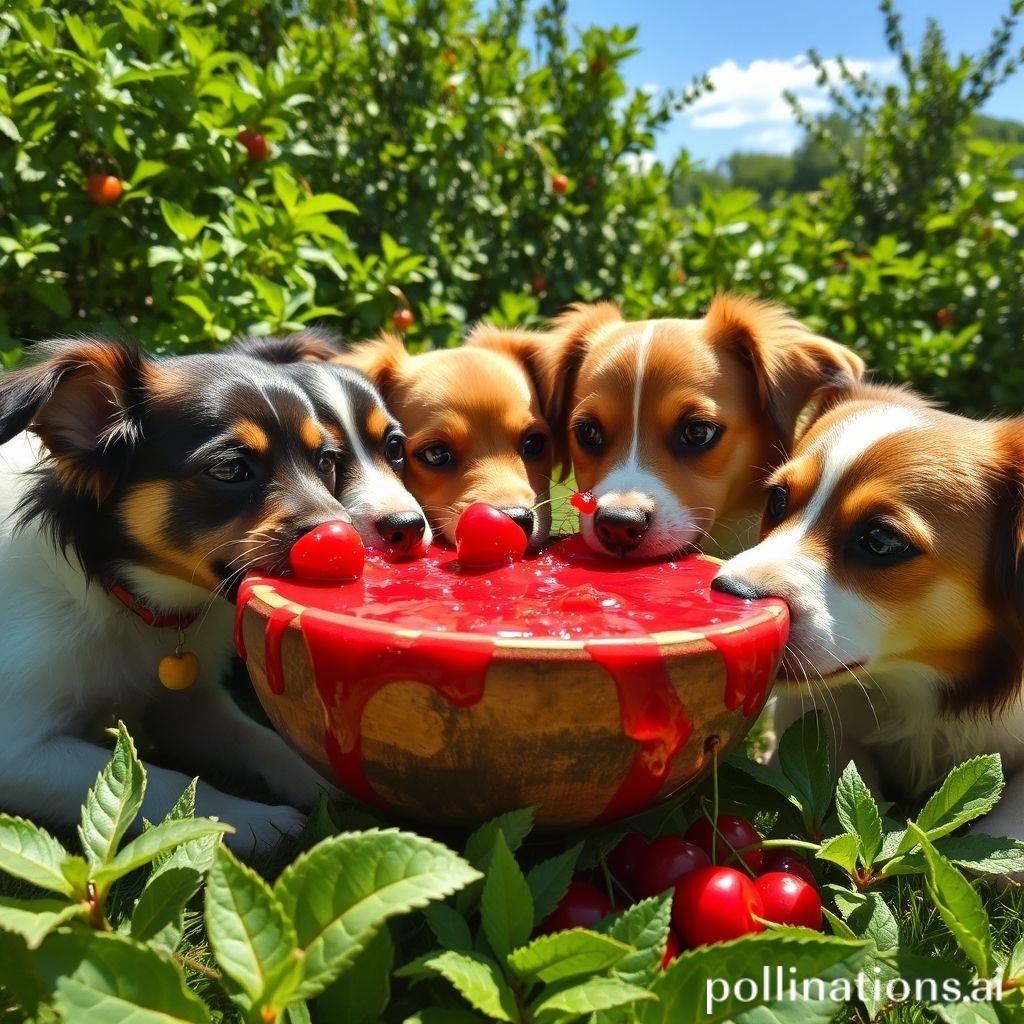Can Dogs Have Cherry Juice?
Can Dogs Have Cherry Juice?
Pet owners everywhere are curious about the safety of giving cherry juice to their furry friends. They’re wondering if it’s alright for dogs to drink this fruity beverage and what potential health advantages or dangers may come with it.
Just like humans, dogs have unique dietary needs, and it’s essential to ensure that any food or drink they consume is safe and beneficial for their well-being. In this article, we will explore the topic of dogs and cherry juice, shedding light on whether it’s a healthy choice or one that should be avoided. So, let’s dive in and discover the facts!

Table of Contents
Understanding Cherry Juice
1. What is Cherry Juice?
Cherry juice is a beverage made from the extracted juice of cherries. Cherries are fruits that come from various species of the Prunus genus. They are known for their vibrant colors and distinct flavors. People often consume cherry juice because of its refreshing taste and potential health benefits.
2. Nutritional Content of Cherry Juice
Cherry juice is not only delicious but also packed with essential nutrients. It is a rich source of vitamins such as vitamin C and vitamin A, which are known for their antioxidant properties. In addition, cherry juice contains minerals like potassium and manganese, as well as dietary fiber.
An 8-ounce serving of cherry juice typically provides around 120 calories, making it a relatively low-calorie beverage option. In contrast, it’s important to note that the nutritional content may vary depending on the specific brand or homemade preparation.
3. Health Benefits of Cherry Juice for Humans
Cherry juice has gained popularity due to its potential health benefits. It is believed to have anti-inflammatory properties, which can help reduce muscle soreness and aid in post-exercise recovery. Some studies suggest that cherry juice consumption may also contribute to improved sleep quality and duration.
Furthermore, cherries are a natural source of compounds called anthocyanins. These antioxidants have been associated with various health benefits. They may help protect against oxidative stress and inflammation, potentially reducing the risk of chronic diseases like heart disease and certain types of cancer.
Whilst cherry juice offers potential health benefits for humans, it is crucial to consult with a veterinarian before considering giving it to your dog. Different species can have varying tolerance levels to certain foods, so it’s important to ensure the safety and well-being of your furry friend.
Expert Tips: Enjoy the refreshing taste of cherry juice while reaping its potential benefits. Consult a vet before giving it to your furry friend.Can Dogs Drink Cherry Juice?
1. Potential Risks of Giving Cherry Juice to Dogs
During cherries may be a delicious and nutritious treat for humans, it’s important to note that cherry juice may not be suitable for dogs. There are several potential risks associated with giving cherry juice to dogs:
- Cyanide Poisoning: Cherries contain cyanide, which can be toxic to dogs in large quantities. The pits and stems of cherries are particularly high in cyanide.
- Upset Stomach: Cherry juice may cause gastrointestinal upset, leading to vomiting or diarrhea in some dogs.
- Allergic Reactions: Dogs can develop allergies to certain fruits, including cherries. It’s essential to monitor your dog for any signs of allergic reactions, such as itchiness, swelling, or difficulty breathing.
2. Can Dogs Tolerate Cherries?
During some dogs may be able to tolerate cherries in small quantities, it’s generally recommended to avoid feeding cherries to dogs. The pits and stems of cherries pose a choking hazard and can cause intestinal blockages. Additionally, the high sugar content in cherries can contribute to weight gain, dental issues, and diabetes in dogs.
3. Can Dogs Safely Consume Cherry Juice?
It is not recommended to give cherry juice to dogs. The concentrated form of cherry juice can contain higher levels of sugar and may exacerbate the risks mentioned earlier. Furthermore, dogs have different digestive systems compared to humans, making it challenging for them to process certain fruits and their juices.
4. Factors to Consider Before Giving Cherry Juice to Dogs
If you are considering giving cherry juice to your dog, it is important to consult with your veterinarian beforehand. They can provide personalized advice based on your dog’s health, age, and any existing medical conditions. Your veterinarian may recommend alternative fruits or beverages that are safer and more suitable for your dog’s dietary needs.
| Potential Risks: | Can Dogs Tolerate Cherries? | Can Dogs Safely Consume Cherry Juice? | Factors to Consider Before Giving Cherry Juice to Dogs |
|---|---|---|---|
| Cyanide poisoning, upset stomach, allergic reactions | Some dogs may tolerate cherries, but it is generally recommended to avoid feeding them to dogs | Not recommended due to potential risks and difficulties in digestion | – Consult with a veterinarian – Consider dog’s health, age, and medical conditions |
Health Benefits of Cherry Juice for Dogs
1. Anti-inflammatory Properties
Cherry juice is known for its anti-inflammatory properties, which can also benefit dogs. This juice contains compounds called anthocyanins that help reduce inflammation in the body. Dogs suffering from conditions like arthritis or other inflammatory diseases may find relief by consuming cherry juice.
2. Antioxidant Benefits
Cherry juice is rich in antioxidants that protect the cells in your dog’s body from damage caused by harmful free radicals. These antioxidants can support your dog’s overall health and well-being by reducing oxidative stress. This is especially beneficial for older dogs or those with a weakened immune system.
3. Potential Improvement in Joint Health
Cherry juice may also have potential benefits for improving joint health in dogs. The anti-inflammatory properties of cherry juice can reduce inflammation in the joints, potentially alleviating discomfort and improving mobility. This is particularly beneficial for dogs with arthritis or other joint-related issues.
It is important to note that Whilst cherry juice can offer potential health benefits for dogs, it should be given in moderation and under the guidance of a veterinarian. Giving too much cherry juice can cause digestive upset or other adverse effects. Additionally, it is crucial to ensure that the cherry juice does not contain any added sugars or artificial sweeteners, as these can be harmful to dogs.

Risks and Precautions
1. Allergic Reactions in Dogs
Dogs can develop allergic reactions to certain foods, such as cherries and cherry juice. It’s important to watch out for signs of an allergic reaction in your dog, such as itching, swelling, or difficulty breathing. If your dog experiences any of these symptoms after consuming cherry juice, it’s best to avoid giving it to them in the future.
2. Digestive Issues and Diarrhea
Cherry juice contains natural sugars and fiber, which can cause digestive issues in dogs if consumed in large quantities or if the dog has a sensitive stomach. Some dogs may experience diarrhea or an upset stomach after drinking cherry juice. To prevent this, introduce cherry juice to your dog’s diet gradually and in small amounts, and monitor their digestive response.
3. High Sugar Content in Cherry Juice
Cherry juice has a high sugar content, which can be harmful to dogs if consumed excessively. Too much sugar can lead to weight gain, dental problems, and even diabetes in dogs. It’s important to limit the amount of cherry juice given to your dog and ensure it is part of a balanced diet.
Before giving your dog cherry juice, consult with your veterinarian to assess your dog’s individual health needs and determine if it is safe for them to consume. Additionally, always choose natural, organic cherry juice without any additives or artificial sweeteners, as these can be toxic to dogs.
| Risks and Precautions |
|---|
| Allergic Reactions in Dogs |
| Digestive Issues and Diarrhea |
| High Sugar Content in Cherry Juice |
Alternatives to Cherry Juice for Dogs
1. Other Safe Fruits for Dogs
At the same time cherry juice may not be the best option for dogs, there are several other fruits that can provide similar health benefits. Here are some safe alternatives:
- Blueberries: These small berries are rich in antioxidants, which can help boost a dog’s immune system.
- Watermelon: This juicy fruit is not only hydrating but also a good source of essential vitamins and minerals for dogs.
- Pineapple: Dogs can enjoy the taste of pineapple, and it contains an enzyme called bromelain that aids in digestion.
2. Importance of Moderation and Variety in a Dog’s Diet
Pertaining to feeding dogs, it is important to maintain moderation and provide a variety of foods. At the same time some fruits are safe for dogs, they should only be given as occasional treats in small quantities. Feeding too much fruit, including cherry juice, can upset a dog’s stomach or cause diarrhea. Dogs need a balanced diet that includes proteins, carbohydrates, and fats to thrive. Incorporating a variety of foods, such as lean meats, vegetables, and whole grains, ensures that dogs receive all the necessary nutrients for optimal health.
Conclusion
At the same time cherry juice may be safe for dogs to consume in moderation, it is important to exercise caution. The pits and stems of cherries contain cyanide, which can be harmful to dogs.
Additionally, the high sugar content in cherry juice can contribute to weight gain and dental issues. If you choose to give your dog cherry juice, it is crucial to remove all pits and stems and offer it as an occasional treat. Conversely, it is always best to consult with your veterinarian before introducing any new food or beverage into your dog’s diet.
FAQ about Dogs and Cherry Juice
FAQ 1: Can cherry juice be toxic to dogs?
Cherry juice can be toxic to dogs. Cherries contain cyanide, which is harmful to dogs when consumed in large amounts. The cyanide can cause gastrointestinal upset, difficulty breathing, and even lead to cyanide poisoning. It is crucial to keep cherry juice and other cherry products away from your furry friend.
FAQ 2: How much cherry juice can dogs safely consume?
Dogs should not consume cherry juice at all. Even a small amount of cherry juice can cause negative health effects in dogs due to its toxic properties. It is best to avoid giving cherry juice to your canine companion to ensure their well-being.
FAQ 3: Are there any specific breeds that should avoid cherry juice?
All dog breeds should avoid cherry juice. The toxic properties of cherries can affect dogs of any breed, size, or age. It is recommended to keep cherry juice out of reach and opt for safe and dog-friendly treats and beverages instead.
FAQ 4: Can cherry juice help with urinary tract health in dogs?
Meanwhile cherry juice may contain beneficial compounds for humans, there is no scientific evidence to suggest that it can help with urinary tract health in dogs. It is always best to consult with a veterinarian for appropriate dietary recommendations and treatments for your dog’s specific health concerns.
FAQ 5: Should cherry juice be diluted before giving it to dogs?
Cherry juice should not be given to dogs, whether diluted or not. The toxic properties of cherries remain present even when diluted, potentially causing harm to your furry friend. It is essential to prioritize your dog’s health and provide them with safe and appropriate food and beverages.
Read Similar Post:
1. Delicious Homemade Cherry Juice Recipe: Easy Step-by-Step Guide
2. Delicious Tart Cherry Juice Mixology: Discover Exciting Pairings

